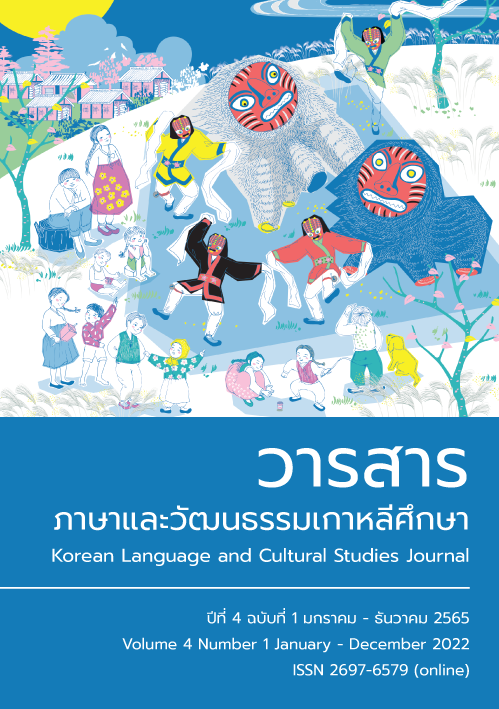The Myth of Justice in The Devil Judge
Main Article Content
Abstract
The purpose of this paper is to study the ethical interpretation of justice in The Devil Judge, a Korean television series broadcast in 2021. By applying Roland Barthes’ concept of Mythology and Semiotic Theory, the study reveals that this series present dialectic argument about the meaning of justice and the importance of justice process. Various elements of Bertolt Brecht’s dramatic theory are put into practice to introduce the aforesaid concepts as well as a thought-provoking response among the audiences. Thus the series, which apparently appears as “a play within a play,” shows how all the allegorical characters represents the fight between good and evil.
Article Details
References
เจตนา นาควัชระ. (2524). ข้อยกเว้นและกฎเกณฑ์: ละครเบรคชท์ในสังคมไทย. วารสารอักษรศาสตร์มหาวิทยาลัยศิลปากร, 4(2), 17-46.
_____________. (2526). วรรณกรรมละครของแบร์ทอลท์ เบรคชท์ การศึกษาเชิงวิจารณ์. กรุงเทพฯ: ไทยวัฒนาพานิช.
ชองอิลจุนและวิเชียร อินทะสี. (2557). ประวัติศาสตรก์ารเมืองเกาหลีสมัยใหม่. โซล: อิเมจิน บุคส์.
ซูไรมาน เวศยาภรณ์. (2541). งานฉากละคร 1. กรุงเทพฯ: สำนักพิมพ์แห่งจุฬาลงกรณ์มหาวิทยาลัย.
บุญวัฒน์ สว่างวัฒน์. (2559). พัฒนาการทางการเมืองและเส้นทางสู่ประชาธิปไตยของไทยและเกาหลีใต้. วารสารสหวิทยาการการวิจัย: ฉบับบัณฑิตศึกษา, 5(1), 62-74.
โรล็องด์ บาร์ตส์. (2500). มายาคติ (วรรณพิมล อังคศิริสรรพ, ผู้แปล). กรุงเทพฯ: โครงการจัดพิมพ์คบไฟ.
ฤทธิรงค์ จิวากานนท์. (2550). ปริทัศน์ศิลปะการละคร. กรุงเทพฯ: ภาควิชาศิลปะการละคร คณะอักษรศาสตร์ จุฬาลงกรณ์มหาวิทยาลัย.
Huppatz, D. J. (2011). Roland barthes, mythologies. Design and Culture, 3(1), 85-100.
White, J. J. (2004). Bertolt Brecht's dramatic theory. Boydell & Brewer.


